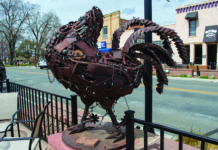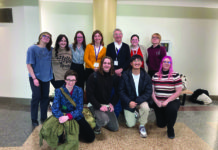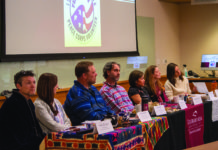
by Maddie Parise
I first heard about plans for the You Can Play movement to come speak at CMU during an organization leader meeting. My initial reaction was to roll my eyes. You Can Play is an organization that works towards increasing the safety and equality of athletes in the LGBTQ community. Their motto expresses the power of athleticism to trump sexual orientation, “If you can play, you can play.”
I should clarify- I did not roll my eyes because of the goals of the organization, I think what they are working towards is necessary, powerful and relevant. Considering how conservative this region is (and even if it was not), it is important to educate people on the right way to treat members of a community, especially one that receives incredible amounts of hatred.
The reason I rolled my eyes was that upon hearing about this effort on campus, my first thought was “great, they’re trying to cover their butts after the baseball fiasco last year.”
John Marshall said the plan was to tackle homophobia head on, in my head that translated to “we want to do what we can to appear accepting of all persons, except fire the person responsible for the whole issue.”
The idea of expressing remorse but avoiding the most obvious solution felt slimy to me. I was irritated. I was offended. I was wrong.
Right from the beginning of the You Can Play presentation, co founder Glenn Whitman made it clear that the key to erasing homophobia lies in education, not prosecution.
“This is the best way to go about it,” Whitman said on the actions of Coach McKinney, “He can learn. We’re human, we all make mistakes.”
Other speakers in attendance were UC Boulder track and field competitor Jaron Thomas, Hamilton College lacrosse goalie Sam Knollmeyer and Angela Hucles, a professional soccer player and Olympic gold medalist.
The athletes, all openly gay, could not express enough how supportive it is to hear a voice standing up for themselves other than their own.
“For me, the biggest support is [others] not staying silent,” Hucles said as the presenters explained the importance of allies.
I found the definition of an ally to be surprising when compared to what I had originally thought. You Can Play noted that one is only an ally if they actively work towards ending homophobia. Saying you support the LGBTQ community but never stepping in to end harassment, abuse or the use of homophobic terms means you’ re not helping the cause.
Being an ally is accessible for all, it could be as simple as calling out casual homophobia. Casual homophobia is when a term that is derogatory towards the LGBTQ community is used in everyday language. Phrases such as “that’s so gay” or “no homo” can negatively affect someone in the community, and is honestly an ignorant come back. You are, at the very least, capable of reading, you can think of a more intelligent insult than “you’re a fag.”
You Can Play explained that calling someone out on their use of casual homophobia doesn’t have to be a huge lecture, keeping your defense informal and quick is the best way to reach someone. Even a defensive statement coming from someone who has used homophobia in the past is still effective, maybe even more effective because admitting your humility and imperfections allows others to see the accessibility of being an ally.
“If we don’t take the opportunity to educate [homophobic people] we’ve missed the opportunity to change their life,” said student body President Josh Dillinger.
The presentation emphasized that harshly snapping at people will not end homophobia. Just like in the situation involving Coach McKinney, cutting someone off for making a homophobic comment will not encourage them to learn more about respecting a community they don’t fully understand.
Though I originally saw this event as being an unsatisfactory cover up for a mistake, I now see that CMU had the right idea. When dealing with a situation of ignorance, jumping on a person will deny them the opportunity to expand their world and become educated.
It’s truly encouraging that our school is taking the right steps to create a more accepting community for all students and staff. In the words of student body Vice President Ben Linzey, “if you’re a Maverick, you’re a Maverick.”





